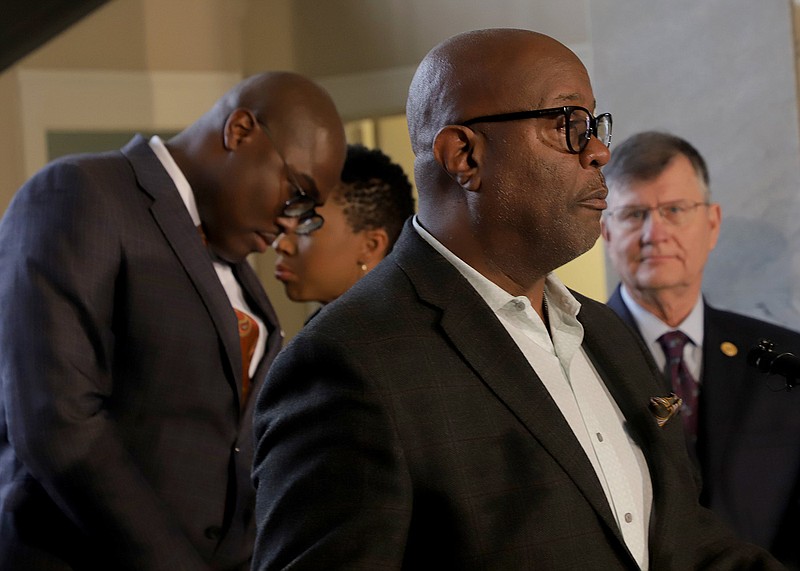Little Rock City Attorney Tom Carpenter has submitted to the office of Attorney General Leslie Rutledge a request for a legal opinion regarding the release of some records after a Dec. 31 incident in which the police chief fired his gun at an armed suspect.
[DOCUMENT: Letter requesting legal opinion from Arkansas AG » arkansasonline.com/118letter/]
In an email to city officials Friday evening, Carpenter attached the letter itself as well as a copy of the email he sent to the attorney general's office a short while earlier.
Circumstances of the New Year's Eve incident had "created a tension between a prosecuting attorney's obligation not to unfairly taint a criminal investigation, or the person being investigated," with the city's obligation to meet the "laudable purpose" of the Arkansas Freedom of Information Act, Carpenter wrote in his letter to the attorney general.
According to the account of the shooting provided by authorities, Little Rock Police Chief Keith Humphrey was on patrol that night, as were other top Police Department officials, when he encountered a fight that resulted in a shooting outside an Asher Avenue gas station.
Authorities said Humphrey fired his service weapon at an armed suspect, later identified as 29-year-old Taz Hayes. He apparently did not hit her; she was reported to be uninjured.
The victim of the shooting, 22-year-old Kelecia Mayo, was hospitalized, according to police. Hayes was arrested after fleeing the scene. She has pleaded innocent to a first-degree battery charge.
Humphrey returned to duty last Thursday with the approval of Mayor Frank Scott Jr. after the chief had been placed on administrative leave following the New Year's Eve incident, in keeping with departmental practices.
Separate investigations by law enforcement agencies are examining Humphrey's actions that night.
Arkansas State Police agents are expected to submit information to the Pulaski County prosecuting attorney's office so prosecutors can determine whether Humphrey's use of force was consistent with the law. Additionally, the incident is the subject of an internal Police Department probe.
The conclusions of both investigations have yet to be announced.
In his letter to Rutledge on Friday, Carpenter recounted the events surrounding the shooting. In the immediate aftermath, officials quickly decided to have the Arkansas State Police and prosecutors conduct the criminal investigation, Carpenter wrote.
He added that typically the Police Department would conduct the criminal and internal investigations in the event that one of its officers were involved in a shooting.
"The Prosecutor has a very serious concern that the disclosure of any information the City has about Chief Humphrey before the conclusion of the criminal investigation creates an ethical issue," Carpenter wrote.
He referred to the Arkansas Rules of Professional Conduct, which impose restrictions on what attorneys and prosecutors can say about a legal matter or investigation in terms of their out-of-court statements.
When the city began receiving records requests Jan. 1, many were for records that were part of an ongoing criminal investigation and therefore exempt from immediate disclosure under the open-records law, Carpenter wrote.
But he acknowledged the city had also received a request for all de-escalation training Humphrey had undergone.
"While such information may be relevant to an ongoing criminal investigation, it was not created for the criminal investigation," Carpenter wrote. "Hence, absent some other AFOIA exemption, the City would typically disclose any such public records."
However, the atypical nature of the officer-involved shooting investigation meant the city was not conducting the criminal investigation, he wrote, and the views of the prosecuting attorney's office were different.
He referred to a Jan. 5 email he received from John Johnson, chief deputy prosecuting attorney, stating that office's position that no information be released until a criminal case has been closed.
"In response to Chief Deputy Prosecutor Johnson's request, the City took the position that it would honor the request made," Carpenter wrote. "However, as the requests increased, it became clear that there were a number of items that did not square with various interpretations of information that can be initially exempted from AFOIA disclosure."
He went on to list requests the city believed could be denied because of the ongoing criminal-investigation exemption, such as body-camera footage and incident reports.
Some other items could be deemed partially exempt where the requested records pertained to the Dec. 31 incident, Carpenter wrote. The exemption would apply at most until the criminal investigation is closed, he wrote.
Additionally, records related to the chief's administrative leave and copies of any complaints filed against Humphrey were exempt because they dealt with an employee's evaluation, Carpenter wrote.
At the same time, he wrote that the city "believes that it should comply with the disclosure of the information contained in" a subsequent list of nine requests.
They included records of Humphrey's training on firearms or the use of deadly force -- a request submitted by the Arkansas Democrat-Gazette -- as well as documentation of Humphrey's training regarding body-worn cameras and the motor vehicle recording system.
Carpenter also indicated the city should release all records in response to FOIA requests submitted between Jan. 1-12 by staffers for several local television stations as well as by a reporter for the Democrat-Gazette.
However, it was unclear based on Carpenter's letter whether materials such as body-camera video, which the city attorney earlier in his letter described as exempt, would remain undisclosed even if the video had been requested by a news reporter.
At a city board meeting last week, Carpenter indicated he wanted to seek the opinion of the attorney general. He suggested the city and board members were "at risk" because Little Rock was withholding records that seemed to be subject to release under the FOIA.
